#shopware6
Text
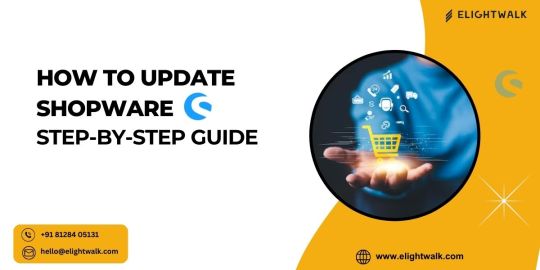
1 note
·
View note
Text
Best E-commerce Theme for Your E-commerce Store
In the dynamic world of e-commerce, choosing the right theme for your online store is essential. A well-designed theme not only enhances the visual appeal of your website but also ensures a seamless shopping experience for your customers.This blog will explore the top e-commerce themes suitable for your online store, considering fashion, retail, and sports industries. We'll discuss their features and benefits and provide links for your convenience.
Fashion Theme: Elevate Your Style
When it comes to fashion e-commerce, aesthetics matter. Your online store needs a theme that showcases your products in an appealing way. The "Elegance Couture" theme is a perfect choice. Its sleek design and customizable options make it an excellent fit for fashion stores.
Learn more about the Elegance Couture theme here
E-commerce Store: The Hub of Online Shopping
For a general e-commerce store that sells a variety of products, the "Universal Shopper" theme is a versatile option. This theme offers a clean and user-friendly interface, making it easy for customers to find and purchase items.
Explore the Universal Shopper theme here
Retail Industry: Delivering Customer Satisfaction
The retail industry requires an e-commerce theme that prioritises functionality and user experience. "Shopify Retail Pro" does just that. It's designed with retail stores in mind, offering features like inventory management and easy checkout.
Find out more about the Shopify Retail Pro theme here
Sports Theme: Keeping the Game Strong
For online stores focused on sports-related products, the "Athlete's Choice" theme is the way to go. This theme is optimised for showcasing sports gear and equipment, and it provides a dynamic look and feel.
Take a closer look at the Athlete's Choice theme here
Why Theme and Customization Matters?
In e-commerce, theme and customisation are important since they have a direct effect on conversion rates and user experience.
Your website can become more aesthetically appealing, navigable, and user-friendly with the help of a well-designed theme. Longer session durations, higher customer engagement, and more transactions may result from this.
Moreover, a personalised theme can assist you in developing a more distinctive and memorable business identity. You have a better chance of drawing in and keeping visitors to your website when it distinguishes itself from the competition.
In e-commerce, themes and personalization are important since they can assist you in various ways. Let's see the major ones;It enhances the experience for users, helps to boost conversion rate and it boosts overall awareness of the brand.
For More Themes and Customization
Selecting the right e-commerce theme is a crucial step in creating a successful online store. Whether you're in the fashion, retail industry, or sports niche, there's a theme that suits your unique needs. Don't forget to customise your chosen theme to match your brand's identity. Happy selling!
If you liked the themes mentioned in this article and want more options or assistance with customising them for your business, feel free to contact us. Our team of theme developers can help you find the perfect theme and tailor it to your needs Contact us or Email us at [email protected]. Your e-commerce success is just a message or call away!
0 notes
Text
#agentur#agency#werbeagentur#kreativagentur#agenturleben#agencylife#agenturalltag#design#gunzenhausen#projekt#referenz#webdesign#shopdesign#individuell#Shopware#Shopware6#onlineshop#onlinestore#programmierung#webentwicklung#korridor#pv#direktvertrieb#photovoltaik#balkonkraftwerke#nachhaltigkeit
0 notes
Text
#Shopware 6#Shopware 6 API#POST and GET parameters#Shopware6 tutorial#Shopware6#Query Parameter#URL Parameter#Shopware 6 HTTP Request#GET parameters#Get Request#Post Request#Shopware Product API#shopware 6#shopware 6 tutorial#shopware 6 guide
1 note
·
View note
Photo

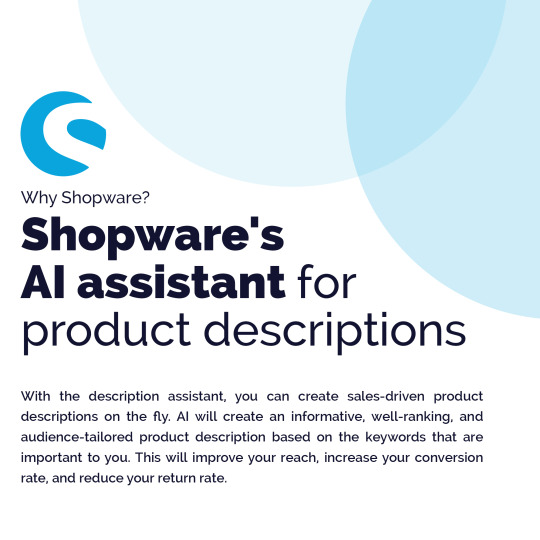
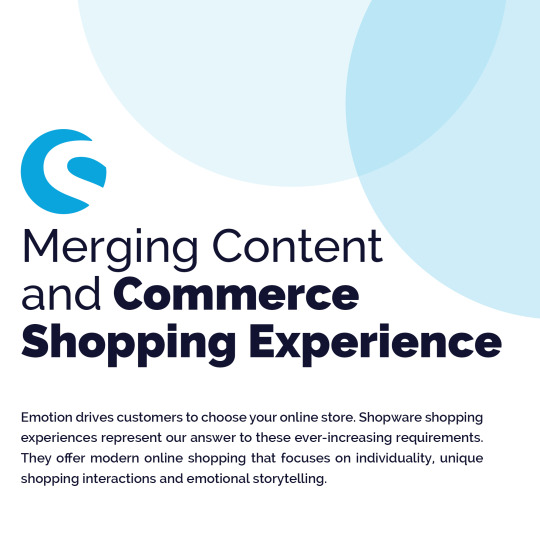
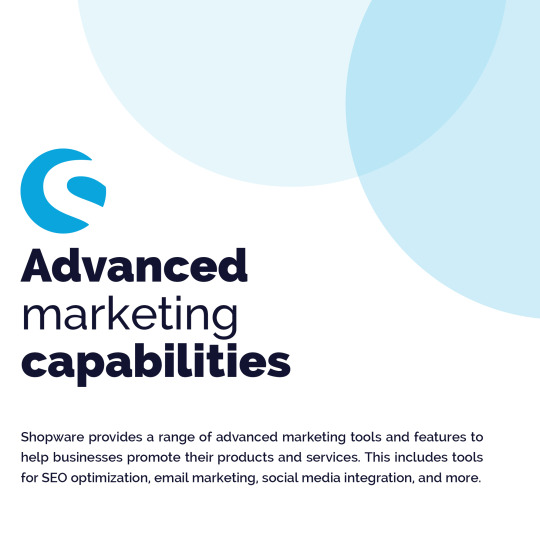
Tired of cookie-cutter e-commerce platforms?
Look no further than Shopware !
With AI assistant, emotional shopping features and advanced marketing capabilities you can connect with customers from around the world and build a loyal following.
Check out more: https://lnkd.in/gdwFRfAP
#Shopware #UniqueShoppingExperience #Aiassistant #Shopwaredevelopmentindia #shopware6
0 notes
Text
How to Add a New Manufacturer in Shopware6
How to Add a New Manufacturer in Shopware6
In this article, you are going to learn about ” How to Add a New Manufacturer in Shopware6?”
Shopware is an eCommerce platform, that is instantly gaining new users all over the world. This open-source solution based on Vue js is ultra-flexible and scalable. This makes it an ideal choice for both a large marketplace and local brands.
The software is flexible enough to use for different types of…
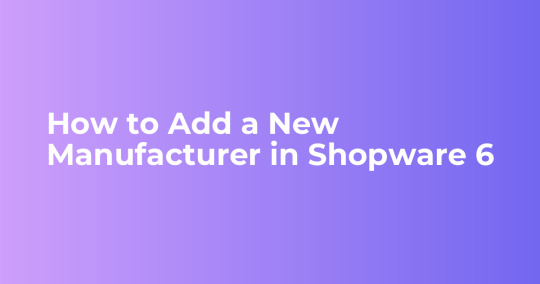
View On WordPress
0 notes
Text
Shopware6 Mobile Application for iOS and Android from iCreative Technologies

You can turn your Shopware shop into a hybrid mobile app, giving your customers the best of both native and web app experiences. Online retailers will be able to allow their customers to shop directly from their mobile app with increased security and speed thanks to Shopware. iCreative Technologies provides you with a hybrid Shopware mobile app for iOS and android that enhances the user experience. Here is comprehensive information.
#Shopware#Shopware6#Shopware Mobile App#Shopware Mobile Application#Shopware Development#Shopware Development Company#Shopware Development Services#Shopware App Development Services#iCreative Technologies
0 notes
Photo
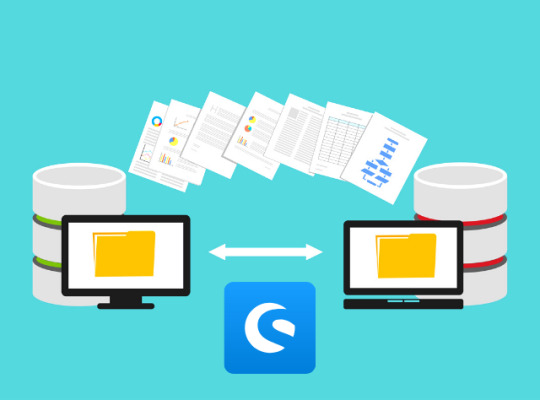
Shopware is one of the trending eCommerce platforms for developing highly responsive and multi-feature online store. In this blog, we have provided a complete guide for Shopware 6 migration from other platforms.
0 notes
Text
How to Update Shopware - Step-by-Step Guide
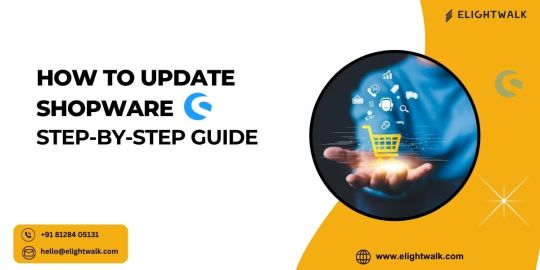
Updating your Shopware e-commerce platform is crucial for security, performance, and access to the latest features. Our guide offers a step-by-step walkthrough to confidently navigate the update process and keep your online Store running smoothly. Let's learn how to update Shopware like a pro!
Create a test Environment.
We strongly advise creating a test environment before updating Shopware to test the update thoroughly in your specific setup. Learn how to set up a test environment with our detailed guide.
Secure Your Update:
Ensure a secure update process by creating a backup, allowing for a seamless rollback in case of issues. Prioritize this step, even if a test environment has been utilized, to safeguard the live system during the update.
Extension Compatibility - IMPORTANT:
Ensure a smooth update by confirming the compatibility of your installed extensions with the latest Shopware version. Check for updates in our Store, use the Auto-Updater in the admin, or verify compatibility in your Shopware Account under Licenses to prevent potential issues during the update process.
Updating shopware via the browser
Use the Shopware Installer for quick and easy Shopware installation or updates. Save the same PHP file in an empty public directory; it initiates the installation process when called. For existing installations, the same file triggers the update process seamlessly.
1. Download PHP File:
Access the download area and download the Shopware Installer PHP file (1).
2. Move to Public Folder:
Place the downloaded PHP file into the public folder of your existing Shopware installation.
3. Open in Web Browser:
To initiate the installation or update process, open the PHP file in your web browser
Update per administration
To perform a direct update through the administration, follow these steps:
1. Go to Settings > System > Shopware Update.
2. you can view your current version in the window that appears.
3. Note that the 'Update code' field is optional and is typically required for specific bug fixes provided by support.
4. Please remember that administration updates are limited to the latest version available.
Step 1: Look for an update
Click the 'Check for Updates' button to easily search for and verify if you can update your Shopware platform to the latest version.
Step 2: Check system requirements
Before starting the update process, the system checks all requirements to ensure they are met. Please verify and adjust system requirements to ensure a smooth update process.
Step 3: Deactivate extensions
Please make sure to deactivate any incompatible extensions before installing the update. Once you have confirmed that you have created a backup, the 'Install' button will activate, and you can proceed with the update. If any incompatible or unverifiable extensions are found, a prompt will appear.
What options do I have if the automatic updater cannot deactivate all extensions?
Deactivate All Extensions:
If the update doesn't initiate, choose 'Deactivate all extensions' instead of the default option. Retry is starting the update.
Manual Deactivation:
If the automatic updater can't deactivate extensions, manually deactivate them under 'Extensions' > 'My Extensions' in the Shopware backend.
Database Deactivation:
Deactivate extensions directly in the database using detailed instructions. Exercise caution and follow the provided guidelines.
Major Update Deactivation:
Deactivate all extensions for major updates (e.g., from 6.4 to 6.5). Utilize the instructions from point 3, and omit the WHERE part in the SQL command for deactivation.
Skip Extension Deactivation Options:
If you've used points 2 to 4 during the update form, avoid selecting any options for deactivating extensions.
These solutions have effectively resolved update initiation issues, ensuring a smoother Shopware update process.
Step 4: Install the update
You will see green ticks on the left if you successfully completed the installation steps. That indicates that you can now finish the update.
Update with Composer
It is worth noting that the statement is already valid for Shopware version 6.3.0.
To proceed, please go to your Shopware root directory and execute the given command:
This applies from Shopware 6.3.0 onward. Navigate to your Shopware root directory and run the following command
bin/console system:update:prepare
To update your Shopware installation, run the following command in your Shopware root directory:
composer update
After executing the necessary updates, run the following command in your Shopware root directory to finalize the process and run migrations:
bin/console system:update:finish
To force-update all configuration files, execute the following command in your Shopware root directory:
composer recipes:update
Avoid known issues
APP_ENV=dev web_profiler Missing Extension Error:
Install the Profiler bundle for versions before Shopware 6.4.17.0 to resolve the missing extension error. Run the following command:
composer require --dev profiler
Framework:demo-data Missing Faker Classes:
For versions before Shopware 6.4.17.0, install additional packages to enable the framework:demo-data command. Run the following command:
composer require --dev mbezhanov/faker-provider-collection maltyxx/images-generator
Elightwalk, a growing Shopware development firm, is committed to providing high-quality services. We prioritise client pleasure, provide thorough maintenance and support, and operate projects in a clear and open manner. We value your time and strive to complete projects on schedule without sacrificing code quality. Our objective is to deliver Shopware development services that are dependable and efficient, exceeding your expectations.
0 notes
Text
Shopware Development: The Ultimate Guide to Building Your Online Store
Shopware Development: The Ultimate Guide to Building Your Online Store
In today’s digital age, having a strong online presence is essential for any business looking to succeed. And when it comes to selling products online, having a well-designed and functional online store is crucial. That’s where Shopware development comes in — a powerful e-commerce platform that enables businesses to build and manage their own online stores. But for those new to the world of Shopware, getting started can be overwhelming. That’s why we’ve put together this ultimate guide to Shopware development, covering everything from the basics of setting up your store to more advanced features like customizing your theme and integrating with third-party tools. Whether you’re a seasoned e-commerce professional or just starting out, this guide will provide you with the knowledge and resources you need to build a successful online store using Shopware. So let’s dive in and get started!
Benefits of using Shopware for building an online store
Shopware is an open-source e-commerce platform that offers a range of features and benefits for businesses. One of the main advantages of using Shopware is that it provides a flexible and scalable solution for building an online store. Shopware is designed to be customizable, so businesses can tailor their online store to their specific needs. This means that businesses can create a unique online shopping experience for their customers, which can help to improve customer engagement and loyalty.
Another benefit of using Shopware is that it provides a range of built-in features and functionality, such as product management, order management, and payment processing. This means that businesses can easily manage their online store without having to rely on third-party solutions. Shopware also offers a range of plugins and extensions that can be used to further enhance the functionality of your online store.
Finally, Shopware is a cost-effective solution for building an online store. Since it is open-source, businesses can use Shopware without having to pay licensing fees. This can help businesses to save money while still providing a high-quality online shopping experience for their customers.
Shopware Development: The technical side of things
When it comes to Shopware development, there are a few technical aspects that businesses should be aware of. First and foremost, Shopware is built using PHP, which means that businesses will need to have some knowledge of PHP in order to develop and customize their online store. Additionally, businesses will need to have a basic understanding of HTML, CSS, and JavaScript in order to create custom themes and templates.
One of the key features of Shopware is its modular architecture. This means that businesses can easily add new functionality to their online store by installing plugins and extensions. Shopware also provides a REST API, which can be used to integrate with third-party tools and services.
Another important aspect of Shopware development is testing. Businesses should test their online store thoroughly before launching it to ensure that it is functioning correctly and providing a good user experience. This can include testing for usability, performance, and security.
Shopware Development: The design aspect
In addition to the technical aspects of Shopware development, businesses should also consider the design of their online store. Shopware provides a range of built-in themes and templates, but businesses can also create their own custom designs.
When designing an online store, businesses should consider factors such as usability, branding, and user experience. A well-designed online store can help to improve customer engagement and loyalty, so it’s important to invest time and resources into creating a visually appealing and user-friendly design.
Customizing your Shopware store
One of the key advantages of using Shopware is that it is highly customizable. Businesses can customize their online store in a range of ways, from creating custom themes and templates to adding new functionality through plugins and extensions.
When customizing a Shopware store, businesses should consider factors such as usability, performance, and security. It’s important to test any customizations thoroughly before launching your online store to ensure that they are functioning correctly and providing a good user experience.
Shopware Plugins and Extensions
Shopware provides a range of plugins and extensions that can be used to enhance the functionality of your online store. Plugins and extensions are available for a range of purposes, from adding new payment methods to improving the SEO of your online store.
When choosing plugins and extensions for your online store, it’s important to consider factors such as compatibility, security, and support. Businesses should choose plugins and extensions from reputable developers and test them thoroughly before installing them on their online store.
Shopware Hosting: Finding the right hosting provider
When it comes to hosting your online store, there are a range of options available. Shopware can be hosted on a range of platforms, from shared hosting to dedicated servers.
When choosing a hosting provider for your online store, it’s important to consider factors such as reliability, performance, and security. Businesses should choose a hosting provider that offers a high level of uptime and fast loading times, as well as robust security measures to protect their online store and customer data.
Shopware Support and Maintenance
Once your online store is up and running, it’s important to provide ongoing support and maintenance to ensure that it is functioning correctly and providing a good user experience. Shopware provides a range of resources and support options for businesses, including documentation, forums, and support tickets.
Businesses should also consider investing in ongoing maintenance and support from a Shopware development agency. This can help to ensure that your online store is always up-to-date and functioning correctly, as well as providing access to expert advice and support.
Shopware Security: Keeping your online store safe
Security is a key concern for any online store. Shopware provides a range of built-in security features, such as SSL encryption and two-factor authentication. However, businesses should also take additional steps to protect their online store and customer data.
This can include measures such as regularly updating software and plugins, using strong passwords, and implementing security monitoring and backups. Businesses should also consider investing in regular security audits and testing to ensure that their online store is protected against potential threats.
Conclusion
Why Shopware is the ultimate solution for building your online store.
In conclusion, Shopware is a powerful and flexible e-commerce platform that offers a range of benefits for businesses looking to build an online store. From its customizable themes and templates to its range of built-in functionality and plugins, Shopware provides everything businesses need to create a high-quality online shopping experience for their customers.
However, building and managing an online store can be complex and challenging. That’s why it’s important to work with a Shopware development agency that has the expertise and experience to help you build and maintain a successful online store. With the right support and resources, businesses can take advantage of all that Shopware has to offer and build a successful online store that delivers results.
#shopwaredevelopmentagency#shopware6#shopwaremigration#shopware5to6migration#shopwareagency#shopware5
0 notes
Text
#Database_Table_In_Shopware_6#Shopware_6_Database_Table#Shopware_6_Database_Config_File#Shopware 6 tutorial
1 note
·
View note
Link
A Read On Why Shopware 6 Is Recommended Widely Over Other E-commerce Platforms.
0 notes
Text
HOW TO MIGRATE FROM SHOPWARE 5 TO SHOPWARE 6
Shopware 6 migration is an ongoing thought for all Shopware users. If you are wondering what is Shopware 6? Shopware which is a PHP-based e-commerce application, filled with user-friendly features and tools, has recently launched its latest version – Shopware 6.
Why migrate Shopware 5 to Shopware 6?
Not merely an updated version, Shopware 6 is designed from the ground up and is powered by Symfony and vue.js. With Shopware 6 being highly customizable and automatically responsive, along with the fact that Shopware 5 will no longer receive any new updates post-2024, makes the need for the migration from Shopware 5 to Shopware 6 is much more essential and urgent.
How can I migrate from Shopware 5 to Shopware 6?
Just like any other process and procedure, the shopware migration process has its own planning, phases, and steps involved.
Read on to know more about the relevant information and understand how to migrate your Shopware 5 online store to the latest Shopware 6 version:
Migration Phases
First off you need to be well-versed in the three major phases of migration:
1. Preparation Phase
This phase is all about learning and getting familiar with the required information and system requirements before going forward with the actual migration. This phase includes:
System requirements
Installing Shopware 6 is merely not enough, as before you do you need to ensure that your server meets all necessary system requirements, and they are:
Operating System
Most Unix-based operating systems are supported by Shopware. It is recommended to install Shopware 6 on Ubuntu 18.04 LTS or macOS Mojave 10.14 continue reading...
1 note
·
View note
Text
1 note
·
View note
Text
Steps to Create a Scheduled Task in Shopware 6
Very often, one could want to run any form of code regularly, for example, to automatically clean out old entries now and again. Shopware 6 has a scheduled task for this, commonly referred to as "Cron Jobs." This guide builds upon the plugin foundation guide; however, it isn't required. It's also useful to understand how a plugin's services.xml file works. Here is detailed information about developing a scheduled task in Shopware6.
#Shopware#Shopware 6#Shopware Development#Shopware Development Company#Official Shopware Partner#Shopware Development Solutions#iCreative Technologies
0 notes